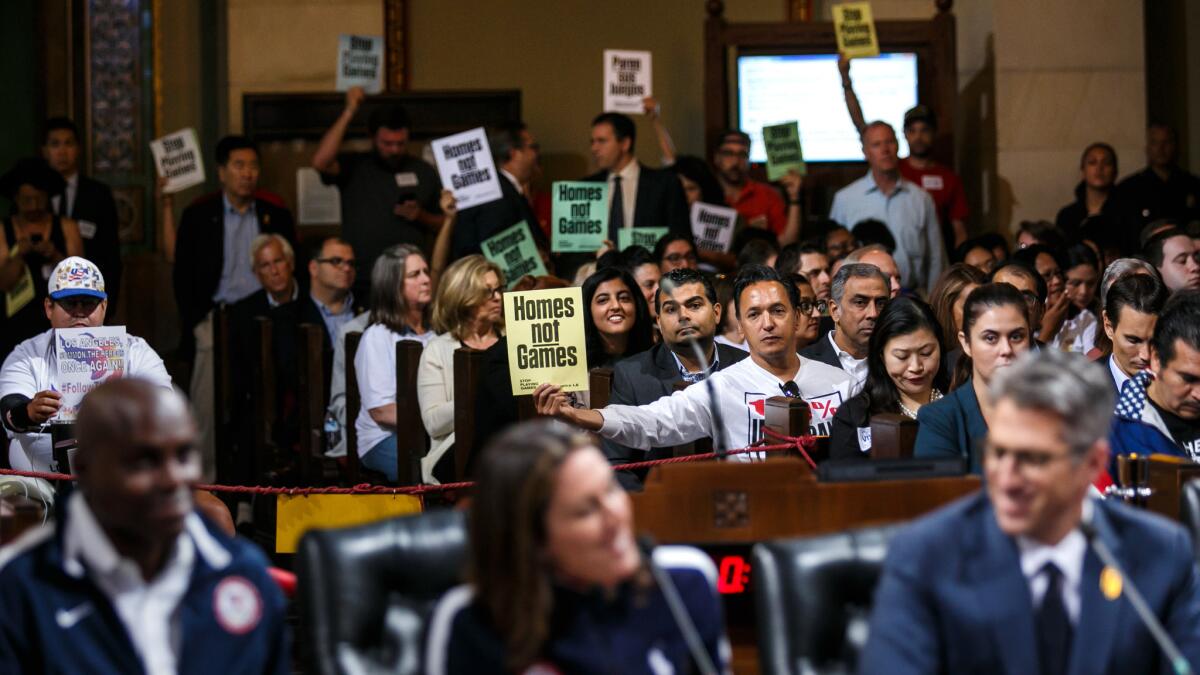Op-Ed: Tokyo’s 2020 Olympics are showing the nightmare waiting for L.A. in 2028

- Share via
TOKYO — Something unprecedented is happening this week in Japan. Activists from around the world are convening for the first-ever transnational anti-Olympics summit. Tokyo protest groups have teamed up with those from recent host cities such as Rio de Janeiro and Pyeongchang, South Korea, and future hosts, including Los Angeles. The summit coincides with the one-year mark before the Tokyo Summer Olympics open on July 24, 2020.
These days, anti-Games campaigns pop up like activist jack-in-the-boxes. Los Angeles wouldn’t have become a U.S. candidate city (and upcoming host) were it not for anti-Games activists who forced Boston’s mayor to back out of that city’s 2024 host contract. Three other bids (Hamburg, Germany; Budapest, Hungary; and Rome) for the 2024 Games were also scuppered after persistent local protests. Feeling the pinch, the International Olympic Committee doled out two Olympics simultaneously, to Paris for 2024, and Los Angeles for 2028.
A handful of negative effects inevitably follow the Games and account for the rise of anti-Olympic activism: overspending, militarization of police, citizen displacement, greenwashing and corruption. Rio de Janeiro, Sochi and even Beijing, with its now derelict venues, are all prime examples of the Games’ grotesque downsides.
The Tokyo Olympics, sold as the most “innovative” ever, are already replicating the usual problems. Start with costs: The original price tag of the 2020 Games, $7.3 billion, has more than tripled.
Tokyo organizers have branded the Games the “recovery Olympics,” in a nod to the 2011 earthquake, tsunami and resulting Fukushima Daiichi nuclear meltdown. Survivors and hard-hit communities are still struggling to rebuild. That reality, says Satoko Itani, a professor of sport, gender and sexuality studies at Kansai University, makes the recovery tagline “ironic” at best. “This Olympics,” Itani said, “is literally taking the money, workers, and cranes away from the areas where they are needed most.”
The Games have also sent thousands into the streets in Japan to protest threats to their civil liberties. In 2017, Japanese legislators rammed anti-terrorism legislation through the parliament, justified by the need to protect the Olympics. The legislation added hundreds of new crimes to the books, including offenses such as sit-ins to oppose the construction of new apartment buildings. The U.N. special rapporteur on the right to privacy said Japan’s government had used fear to push through “defective” legislation.
As if to underline privacy concerns, at every Tokyo Olympic venue, visitors will be subjected to facial recognition systems. This despite the concerns that facial recognition software peddles racial bias. Its acceptance at the Games nudges Japan down a surveillance-state slippery slope.
The Olympics are notorious for displacing everyday residents and Tokyo is no exception. We interviewed a woman in her 60s here who was displaced by the Tokyo Olympics in 1964 and has been displaced again for the 2020 Games. She wouldn’t speak on the record because she fears retribution, and although it won’t undo what has happened to her, she has joined the opposition. “In order to challenge the Olympics the community has to unite and fight,” she told us.
As to greenwashing, the Tokyo Games will showcase Fukushima prefecture, where the torch relay will begin and where baseball and softball games will be played. “It’s fine for athletes and spectators to go to Fukushima for a couple of days,” said Aileen Mioko-Smith with Green Action Japan when the venues were announced. “But the Japanese government is using [the Olympics] to claim that everything is back to normal and that the evacuees should go … home.” The government has also increased what it considers to be acceptable radiation levels from 1 millisievert a year to 20, which it claims presents a far lower cancer rate than smoking or obesity.
The final factor that accompanies most Olympic Games is corruption. (Remember Salt Lake City?) Allegations have already surfaced in Tokyo. Japanese Olympic Committee President Tsunekazu Takeda resigned in March after being included in an ongoing bribery investigation related to securing the 2020 Games. Takeda, who also resigned from the IOC, maintains his innocence. French authorities are looking into $2 million paid by the Tokyo committee to a Singapore-based company implicated in international athletics graft.
City by city, recent Olympics have proved to be plagued by a democracy deficit. Politicians, developers and construction magnates hype bids for the Games with little or no citizen input. And yet the impact on a city of hosting hundreds of thousands of visitors, athletes, media and officials has long-lasting implications for the residents. Even the IOC appears to understand the need for reform. Responding to IOC President Thomas Bach’s concern that the Olympic bidding process creates “too many losers,” the IOC suggested last month that future bidders be asked to hold a referendum before being considered.
Fifteen anti-Games activists from Los Angeles are among those participating in the summit this week (the biggest contingent of any from outside Japan). They have to hope a new referendum rule will crack open the question of whether Angelenos can still stop the 2028 Games. The city’s Olympic Committee, and its cheerleader Mayor Eric Garcetti, brush off recent history when they swat at criticism of their “winning” bid. If voters had a chance to weigh in, would they do the same?
Jules Boykoff is a political science professor at Pacific University in Oregon. Dave Zirin is the sports editor of the Nation.
More to Read
A cure for the common opinion
Get thought-provoking perspectives with our weekly newsletter.
You may occasionally receive promotional content from the Los Angeles Times.










